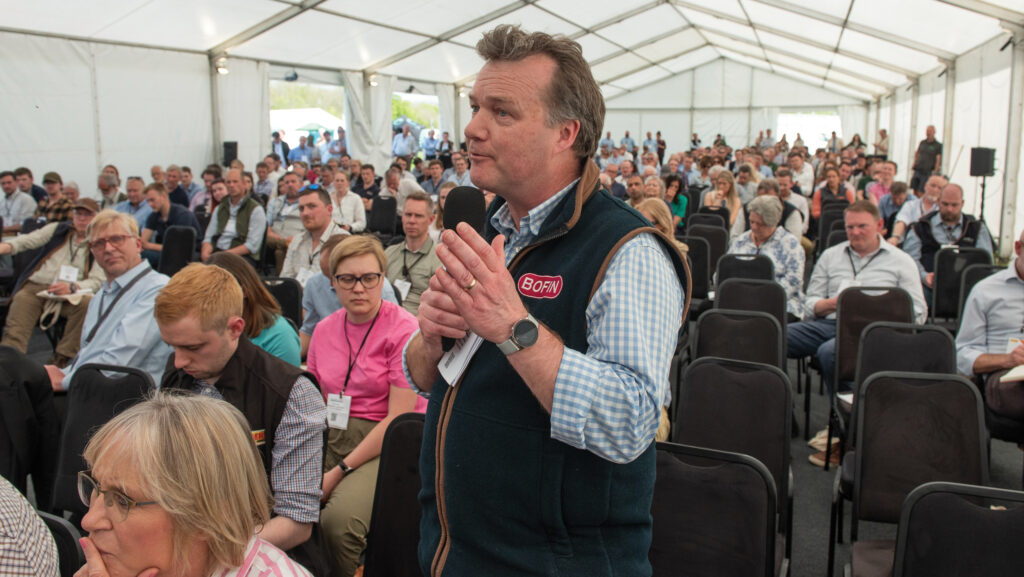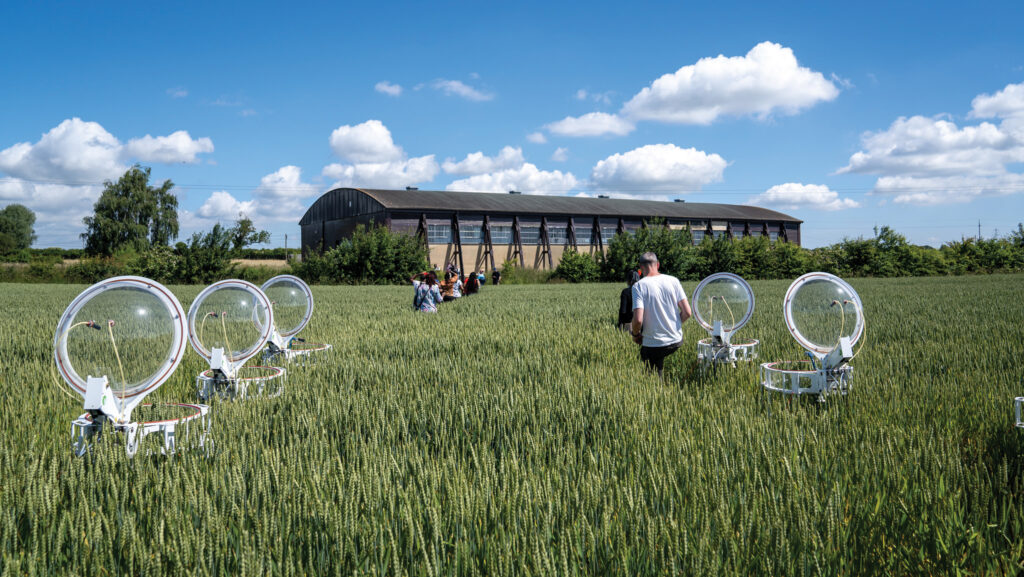Come to Transition Live 2025
 © Phil Weedon
© Phil Weedon Don’t miss your chance to visit Farmers Weekly’s Transition Live event on 8 May in Yorkshire.
The event, at the University of Leeds’ mixed arable and pig farm, is part of our Transition initiative, which aims to explain the complex production, policy and environmental issues facing British farmers.
The day will start with a keynote address, followed by talks and panel discussions. Speakers will include farmers, researchers, policymakers and industry specialists, who will cover three key areas:
- Food production
- Environment
- Business
There will be opportunities to put questions to the industry experts, compare notes with other farmers, share ideas and talk to Leeds researchers about their work.
See also: Listen to our Transition podcasts
Host farm
Central to the event is the chance to take part in informative farm walks around Spen Farm.
The research work is embedded in a 317ha commercial farm that is run under a regenerative agriculture policy.
The regen research compares conventional management including ploughing and inorganic fertiliser applications, with different combinations of min-till, mixed crop varieties, planting understoreys/living mulches and rotations including herbal leys.
Spen then captures data using cutting-edge technology such as soil moisture sensors, imaging techniques and a network of carbon dioxide monitoring flux towers.
The towers are continuously measuring emissions and the data tracks when the carbon dioxide is taken up or released.
The results are combined with weather statistics and input and offtake data from the farm’s outdoor pig unit, arable land and permanent pasture to establish what factors alter carbon balances.
Prof Pippa Chapman of the University of Leeds explains that Transition Live visitors will be able to see the regenerative agricultural trial for themselves on one of two scheduled farm walks.
The second walk will cover the farm’s biomass trial, a joint initiative between Leeds and York universities run by Niab which evaluates renewable crop management, including willow, poplar, eucalyptus and miscanthus.
Pippa says the trial is aimed at potential growers, so is all about the practical elements of growing biomass.

© Leeds University
Speaker insights
Food production
Sustainable livestock systems
Ellie Lovell, Farmers Weekly 2024 Young Farmer of the Year and finance director for Tack Farm, Worcestershire
Ellie oversees the 486ha arable, beef and 800-head dairy farm’s 15 full-time staff.
Above all farms must be profitable – if they are not profitable they cannot begin to be sustainable, says Ellie.
To be profitable they need government support and for it to understand that without that backing, its environmental aims will be unachievable, she says.
We must do our bit too. We need to concentrate on the efficiency factors that cut emissions and lead to profitability – good cow health and welfare, well-planned feeding regimes and breeding programmes that exploit genetics to maximise returns.
Environment
Trees and livestock do mix – making silvopasture work
Farmer Andy Gray Elston Farm, Copplestone, Devon
Devon farmer Andy Gray will explain the multiple benefits of silvopasture – integrating trees and grazing livestock.
Andy’s 65ha Elston Farm runs sustainable farming research projects investigating silvopasture, animal health and welfare, net zero, soil health and soil carbon.
Andy will set the scene for the panel discussion by explaining the successes of the silvopasture enterprises at Elston Farm, where using trees has improved production, particularly with the beef herd.
Business
Innovative forms of finance
Phil Jarvis, land and estates director, Albanwise Farming
Albanwise Farming produces cereals, pulses, oilseed rape and sugar beet from its farmed land in Norfolk and Yorkshire.
Its natural capital assets are managed through a separate division called Albanwise Environment, which aims to maximise the potential of the estate’s environmental features.
The estate was an early adopter of stewardship schemes including Sustainable Farming Incentive options, explains Phil.
He plans to open the discussion session by urging farmers and policymakers to work together to understand how funding schemes can better support the environment and food production.
Innovation hub
In partnership with UK Agri-Tech Centre, the Innovation Hub will draw together farmers, specialists and researchers to discuss innovative ideas and look at how they could be turned into real-life solutions.
The Hub is a meeting space where you can grab a coffee and croissant at the start of the day and meet field experts.
The experts will be there throughout the event to offer practical advice and key skills on the latest ideas and technological research.
It will also showcase the latest innovations and Agri-tech resources that are shaping the future of agriculture for your farm business.
Expert panellist insight
The event also boasts a hugely experienced set of panellists who will add to the speaker’s outlook and answer questions from the audiences.
Renewables
Jonathan Scurlock, NFU chief adviser on renewables and climate change
Jonathan is keen to explain there is good reason to be upbeat about on-farm renewable energy.
The biomethane sector is getting a big wake-up call because gas networks are increasingly interested in investing in it.
Previously, an influential renewable energy taskforce favoured hydrogen but the safety issues with the gas mean methane is now of greater interest to the supply sector.
Methane is the same gas as used in mains systems now, but in a low-carbon form, so there is no need for expensive network upgrades.
Meanwhile aviation is also looking in farming’s direction for biofuel because there is a finite supply of cooking oil – the currently favoured base for renewable supplies.
Some optimism could be directed towards wind power, with the government suggesting changes may be made to planning laws, possibly through permitted development rights.
A change could enable farms to site bigger turbines without planning wrangles.
Succession
Richard Taylor, Strutt & Parker director, north of England
Richard will offer advice on the possible forms of business structure to be considered when deciding on how succession plans are drawn up, and the potential pitfalls.
In most cases succession has related to the timing and degree of responsibility given to, or required from, the next generation in the management of the business, says Richard.
With the government’s proposed alteration to business property relief and agricultural property relief, the focus is not just on the perceived capability of the next generation who will take over the running of the farm.
Instead the focus is more on how soon an equity share should be considered if inheritance tax costs are to be reduced on the death of older members of the business, he explains.
Event information
Date and venue
- Time: 9am to 5.00pm
- Date: 8 May 2025
- Venue: University of Leeds Farm, The Hangar, Spen Common Lane, Tadcaster LS24 9NS
Tickets
For more information and to book tickets, visit the Transition Live 2025 hub.
If you have any questions, email transitionlive@markallengroup.com
Basis CPD points
Transition Live is a Basis-registered event and attendees can qualify for 6 points.
You will need your Basis account number and to complete a form showing your attendance at the designated point on the day.
Agenda
The event opens at 9am with an opening address from Farmers Weekly Transition Project editor Johann Tasker.
A staff member from the University of Leeds will welcome visitors and give a brief overview of the farm.
Talks and panel discussions
Food production
- How to add value to what you already produce
Headline speaker – Maria Benjamin, The Soap Dairy, Lake District - Innovative approaches to food production
Headline speaker – Anna Pearce, Northumberland farmer - Upland farming
Headline speaker: Nic Renison, NFFN farmer, Cumbria - Sustainable livestock system
Headline speaker: Ellie Lovell, dairy farmer, Worcestershire
Environment
- Trees and livestock do mix – making silvopasture work
Headline speaker: Andy Gray, Devon farmer and silvopasture practitioner - Climate resilience
Headline speaker: Richard Bramley, York farmer and NFU Environment Forum - Making a return from renewable energy
Speaker: Jonathan Scurlock, NFU chief adviser on renewables and climate change - Innovative ways of driving value from data
Speaker: Oliver Wood, Omnia
Business
- Exploring new on-farm revenue streams
Speaker: Helen Davies, Canopy and Stars Glamping - Marketing strategies for your farm enterprise
Headline speaker: Ged Futter, retail consultant, The Retail Mind - Innovative forms of farm finance
Headline speaker: Phil Jarvis, Albanwise Farming, Yorkshire - How to succeed at succession
Headline speaker: Sally Jackson, The Pink Pig, Lincolnshire
Expert panel
- Kate Balchin, Wold Top Brewery
- David Brass, The Lakes Free Range Egg Company
- Helen Chesshire, Woodland Trust
- Emma Hosker, White Rose Forestry
- Martin Lines, Nature Friendly Farming Network
- Helen Davies, Canopy And Stars Glamping
- Thomas Gent, Agreena
- Rachael Madeley-Davies, AHDB
- Charles Chantler, Natural England
- Chris Hewis, Anglian Water
- Helen Brass, The Lakes Free Range Egg Company
- Ioan Humphreys, Livestock farmer and Instagram influencer
- Julia Aglionby, Cumbria University
- Peter Gittins, University of Leeds
- Ali Gray, GSC Grays
- Jonathan Scurlock, NFU
- Peter Dilks, Shakespeare Martineau
- Declan Keiley, LightSource BP
- Joseph Gridley, Soil Association
- Nick Evans, Oxbury Bank
- Tom Allen-Stevens, British On-Farm Innovation Network (Bofin)
- Christopher Price, Rare Breeds Survival Trust
- Anna Sutcliffe, ABAgri KW Feeds
- Michael Lee, School of Sustainable Food and Farming
- Richard Taylor, Strutt & Parker
- Jennie Wheildon, Shakespeare Martineau
